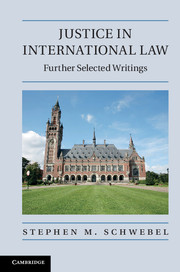Book contents
- Frontmatter
- Contents
- PART I International Court of Justice
- PART II International arbitration
- 12 A BIT about ICSID
- 13 The influence of bilateral investment treaties on customary international law
- 14 The United States 2004 Model Bilateral Investment Treaty: an exercise in the regressive development of international law
- 15 The United States 2004 Model Bilateral Investment Treaty and denial of justice in international law
- 16 Anti-suit injunctions in international arbitration: an overview
- 17 The law applicable in international arbitration: application of public international law
- 18 The validity of an arbitral award rendered by a truncated tribunal
- 19 The authority of a truncated tribunal
- 20 Injunction of arbitral proceedings and truncation of the tribunal
- 21 Public policy and arbitral procedure
- 22 The creation and operation of an International Court of Arbitral Awards
- 23 The Kingdom of Saudi Arabia and Aramco arbitrate the Onassis Agreement
- 24 The Southern Bluefin Tuna case
- 25 A celebration of the United Nations New York Convention on the Recognition and Enforcement of Foreign Arbitral Awards
- 26 Does the consent of the Contracting Parties govern the requirement of an “investment” as specified in Article 25 of the ICSID Convention?
- PART III Miscellaneous
- Collected publications, judicial opinions and book reviews
- Index
23 - The Kingdom of Saudi Arabia and Aramco arbitrate the Onassis Agreement
from PART II - International arbitration
Published online by Cambridge University Press: 07 September 2011
- Frontmatter
- Contents
- PART I International Court of Justice
- PART II International arbitration
- 12 A BIT about ICSID
- 13 The influence of bilateral investment treaties on customary international law
- 14 The United States 2004 Model Bilateral Investment Treaty: an exercise in the regressive development of international law
- 15 The United States 2004 Model Bilateral Investment Treaty and denial of justice in international law
- 16 Anti-suit injunctions in international arbitration: an overview
- 17 The law applicable in international arbitration: application of public international law
- 18 The validity of an arbitral award rendered by a truncated tribunal
- 19 The authority of a truncated tribunal
- 20 Injunction of arbitral proceedings and truncation of the tribunal
- 21 Public policy and arbitral procedure
- 22 The creation and operation of an International Court of Arbitral Awards
- 23 The Kingdom of Saudi Arabia and Aramco arbitrate the Onassis Agreement
- 24 The Southern Bluefin Tuna case
- 25 A celebration of the United Nations New York Convention on the Recognition and Enforcement of Foreign Arbitral Awards
- 26 Does the consent of the Contracting Parties govern the requirement of an “investment” as specified in Article 25 of the ICSID Convention?
- PART III Miscellaneous
- Collected publications, judicial opinions and book reviews
- Index
Summary
In 1923, a British company entered into an exploration contract with the Government of the Kingdom of Saudi Arabia. No oil was found. In 1933, the Standard Oil Company of California (“Socal”) responded positively to an invitation of an emissary of the Kingdom's Government and dispatched a knowledgeable representative who concluded what later came to be called the Aramco Concession Agreement. Article 1 of that Agreement provided that: “The Government hereby grants to the Company on the terms and conditions hereafter mentioned, and with respect to the area defined below, the exclusive right, for a period of sixty years from the effective date hereof, to explore, prospect, drill for, extract, treat, manufacture, transport, deal with, carry away and export petroleum … however … such right does not include the exclusive right to sell crude or refined products … within Saudi Arabia.” The Agreement contained an arbitration clause.
The concession covered a vast area of Saudi Arabia's immense eastern land mass, and was later amended to include its eastern islands and Arabian Gulf waters as well. Except for a number of oases, the area was barren, desolate and hot. The economy of Saudi Arabia in the 1930s was medieval. Every piece of equipment needed by the Company to explore and prospect for oil, and, later, to produce, transport and export it, had to be imported by California Arabian Standard Oil Company (Casoc), Socal's subsidiary that was formed to handle the Arabian concession.
- Type
- Chapter
- Information
- Justice in International LawFurther Selected Writings, pp. 255 - 269Publisher: Cambridge University PressPrint publication year: 2011



